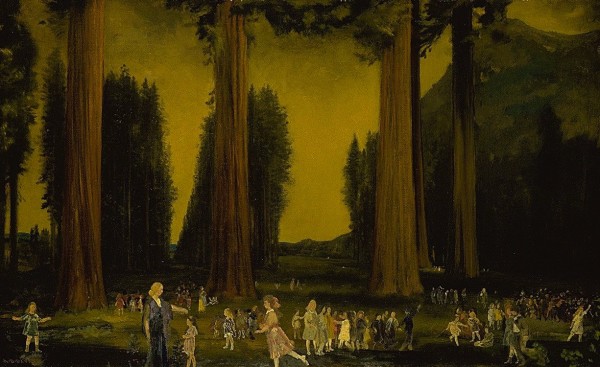Bill Cosby (decades before he became anathema this past year), in one of his most excellent reflections on childhood, described how he and his friends used to play in a vacant lot filled with rocks and broken glass. Nobody ever got hurt until the adults turned it into a playground and in the first week three kids had broken their arms on the monkey bars and several others had delayed their entrance into puberty by being crunched on the seesaw. Before, imagination reigned with unpredictable danger. After, prescribed exercise and predictable injury.
The new play structure in the park across the street from my house takes this ethos one step further. Instead of dirt or bark, it’s on a deep cement slab, which was then covered by recycled rubber padding so children would presumably not be able to hurt themselves. Consistency is king. I feel blessed to have a 100-year-old willow tree in my back yard that is ripe for climbing and falling out of.
The world is becoming disenchanted around me. Down in the local coffee shop there used to be a pipe-smoking room where one could go and pretend to be a young C.S. Lewis or J.R.R. Tolkien. Sometimes (whether you smoked or not) it made doing homework just romantic enough to be tolerable. It’s no longer there – shut down a few years ago by the government’s right hand while it’s left hand simultaneously legalized the sale of weed. The spicy old wood and tobacco of our forebears? Out. “Premium bud” in blisterpacks? In.
Gone is the dicey used book store down the street that used to house the local Wiccan coven. It’s a geological survey office now. They’re still tramping through the forest, but far fewer are pretending to be druids. The Turkish hookah lounge is now home to a real estate agent. The infamous “Rat Haus” bar is an antique shop where even things that were brand new for my grandparents are fair game. All three fountains on the college campus have been replaced with flower beds to reduce cleaning costs and the century old carillon bells in the clock tower are now handled by a loudspeaker hooked up to an MP3 player on a timer.
Because we’re evangelical protestants, worship was and still is held in in a gymnasium or a warehouse with carpet. Stained glass? A baptismal font that doesn’t double as a cattle watering trough? Even a steeple? All apparently extravagant non-essentials from a per-industrial dark age. Who needs cathedrals when you have a reverb stomp box for your guitar?
Even as recently as 20 years back, I remember reading Michael Crichton’s novel Congo (itself a homage to King Solomon’s Mines) and being enchanted by its unmapped reaches of central Africa. Now it’s all on Google Earth – in 3D. I’m not the first or likely even the hundredth person to lament this loss, or rather the side-effect of this gain. In most accounts, satellite imagery features prominently as the bitterest pill. Is there anything mysterious left in the world?
Yes. TONS. And it’s because man and science doesn’t have everything so tidy as we presume. Talk is cheap, but being there on the ground is something else entirely. A brutal storm on the ocean is only barely less scary today than it was for Magellan. We think we’ve got the world all figured out now. Buzzzzz. Wrong. We don’t have a clue. The unknown abounds behind every bush, in every bush, munching on the berries. Kids keep asking these questions. So should we, even if it seems like all the answers are at our fingertips on Wikipedia. They’re not. Not even close. Wake up this morning. Expect to have your mind blown.


